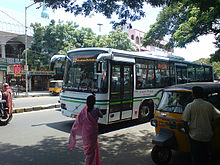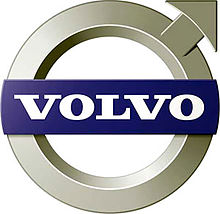| Type | Publicly traded Aktiebolag |
|---|---|
| Traded as | OMX: VOLV B |
| Industry | Heavy equipment |
| Founded | 1927 by SKF |
| Headquarters | Gothenburg, Sweden |
| Area served | Worldwide |
| Key people | Carl-Henric Svanberg (Chairman), |
| Products | Trucks, buses, construction equipment, marine and industrial power systems, aerospace components, financial services |
| Revenue | SEK 310.4 billion (2011)[1] |
| Operating income | SEK 26.9 billion (2011)[1] |
| Employees | 98,162 (end 2011)[1] |
| Subsidiaries | Mack Trucks, Renault Trucks, UD Trucks, Volvo Construction Equipment, Volvo Buses, Volvo Trucks, Volvo Aero, Volvo Penta |
| Website | volvogroup.com |
AB Volvo is a Swedish multinational manufacturing company headquartered in Gothenburg, Sweden. Its principal activity is the production, distribution and sale of trucks, buses, and construction equipment. Volvo also supplies marine and industrial drive systems, and provides financial services. Although Volvo was established in 1915 as a subsidiary of AB SKF, a Swedish ball bearing manufacturer, the auto manufacturer considers itself officially founded on 14 April 1927, when the first car, the Volvo ÖV 4 series, affectionately known as "Jakob", rolled out of the factory in Hisingen, Gothenburg.[2]
Volvo means "I roll" in Latin, conjugated from "volvere", in relation to ball bearing. The name Volvo was originally registered in May 1911 as a separate company within SKF AB and as a registered trademark with the intention to be used for a special series of ball bearing.[citation needed] This idea was only used for a short period of time and SKF decided to use "SKF" as the trademark for all its bearing products.[citation needed]
In 1924, Assar Gabrielsson, a SKF Sales Manager, and Engineer Gustav Larson, the two founders, decided to start construction of a Swedish car. Their vision was to build cars that could withstand the rigors of Sweden's rough roads and cold temperatures.[3]
The company AB Volvo had no activities until 10 August 1926.[citation needed] After one year of preparations involving the production of ten prototypes, was set up to carry out the car-manufacturing business within the SKF group. AB Volvo was introduced at the Stockholm stock exchange in 1935 and SKF then decided to sell its shares in the company. Volvo was delisted from NASDAQ in June 2007, but remains listed on the Stockholm exchange.[4]
In 1999, Volvo sold its car division Volvo Cars to Ford Motor Company for $6.45 billion. The Volvo trademark was shared between AB Volvo, where it is used on heavy vehicles, and the unit of Ford, where it was used on cars. Volvo stopped posting profits in 2005, and in 2008, Ford decided to sell its interest in Volvo Cars. In August 2010, Ford completed its sale of Volvo to the parent of Chinese motor manufacturer Geely Automobile for $1.8 billion.[5][6]
History
The Volvo Group has its origin in 1927 when the first Volvo car rolled off the production line at the factory in Gothenburg.[7] Only 280 cars were built that year.[8] The first truck, the "Series 1", debuted in January 1928, as an immediate success and attracted attention outside the country.[9] In 1930, Volvo sold 639 cars,[8] and the export of trucks to Europe started soon after; the cars did not become well-known outside Sweden until after World War II.[8]
Marine engines have been part of the Group almost as long as trucks. Pentaverken, founded in 1907, was acquired in 1935. As early as 1929, however, the U-21 outboard engine was introduced. Manufacturing continued until 1962.
The first bus, named B1, was launched in 1934, and aircraft engines were added to the growing range of products at the beginning of the 1940s. In 1963, Volvo opened the Volvo Halifax Assembly plant, the first assembly plant in the company's history outside of Sweden in Halifax, Canada.
On 28 January 1999, Volvo sold its car division Volvo Cars to Ford Motor Company for $6.45 billion. In August 2010, Ford completed its sale of Volvo to the parent of Chinese motor manufacturer Geely Automobile for $1.8 billion.[5][6]
On 2 January 2001, Renault Véhicules Industriels (which included Mack Trucks, but not Renault's stake in Irisbus) was sold to Volvo, which renamed it Renault Trucks in 2002. As a result, former mother company Renault became AB Volvo's biggest shareholder with a 20% stake (in shares and voting rights).[citation needed]
In 2006, AB Volvo acquired from Nissan Motor Co Ltd (part of the Renault-Nissan Alliance), 13% of the shares in the Japanese truck manufacturer UD Trucks former Nissan Diesel, and became a major shareholder. In 2007, the Volvo Group took complete ownership of Nissan Diesel to extend its presence in the Asian Pacific market.[3][10]
In the last ten years, the company has undergone rapid growth in the service area with, for example, financial solutions supporting the sales of the manufacturing business units.
In 2010, Renault sold a 14.9% stake in AB Volvo.[citation needed] As of this transaction, "The Swedish holding company" which also has stakes in other Swedish companies has 18.7% of the voting rights and 6.2% of the share capital.[citation needed] The Swedish holding company is now the AB Volvo largest shareholder.
In December 2012, Renault has sold the last of its ownership shares (62.5%).[citation needed]
Business

Volvo Group's operations include:
- Volvo Trucks (midsize-duty trucks for regional transportation and heavy-duty trucks for long distance transportation, as well as heavy-duty trucks for the construction work segment)
- Mack Trucks (light-duty trucks for close distribution and heavy-duty trucks for long distance transportation)
- Renault Trucks (heavy-duty trucks for regional transportations and heavy-duty trucks for the construction work segment)
- UD Trucks (midsize-duty trucks)
- VE Commercial Vehicles Ltd (VECV), a 50:50 joint venture between the Volvo Group and Eicher Motors Limited
- Volvo Construction Equipment (construction machines) (previously Volvo BM, see also AB Bolinder-Munktell)
- SDLG (Shandong Lingong Construction Machinery Co., Ltd., China)
- Volvo Buses (complete buses and bus chassis for city traffic, line traffic and tourist traffic)
- Volvo Penta (marine engine systems for leisure boats and commercial shipping, diesel engines and drive systems for industrial applications)
- Volvo Financial Services (customer financing, inter-group banking, as real estate administration)
- Volvo Rents (construction equipment rental)
Trademark
Volvo Trademark Holding AB is equally owned by AB Volvo and Volvo Car Corporation.[11]
The main activity of the company is to own, maintain, protect and preserve the Volvo trademarks (including Volvo, the Volvo device marks (grille slash & iron mark) Volvo Aero and Volvo Penta) on behalf of its owners and to license these rights to its owners. The day-to-day work is focused upon maintaining the global portfolio of trademark registrations and to extend sufficiently the scope of the registered protection for the Volvo trademarks.
The main business is also to act against unauthorised registration and use (including counterfeiting) of trademarks identical or similar to the Volvo trademarks on a global basis.[12]
Brands
- Volvo Trucks
- Volvo Buses
- Volvo Construction Equipment
- Volvo Aero
- Volvo Finance Service
- Renault Trucks
- UD Trucks
- Prevost
- Mack Trucks
- Eicher (50:50 joint venture with Eicher Motors, India)
- Volvo Penta
- Nova Bus
- SDLG (Shandong Lingong, China)
- Volvo Rents
See also
- Port of Gothenburg
References
- ^ a b c "Annual Results 2011" (PDF). Volvo. Retrieved 4 February 2012.
- ^ "Volvo's founders : Volvo Group – Global". Volvo.com. 14 April 1927. Retrieved 12 June 2009.
- ^ a b "History time-line : Volvo Group – Global". Volvo.com. Retrieved 12 June 2009.
- ^ "AB Volvo applies for delisting from Nasdaq". Forbes. 14 June 2007. Retrieved 6 November 2010.
- ^ Clark, Andrew (28 October 2009). "Ford set to offload Volvo to Chinese carmaker Zhejiang Geely | Business | guardian.co.uk". Guardian (UK). Retrieved 4 December 2009.
- ^ Wire, News (3 August 2010). ""Ford sells Volvo to Chinese carmaker Geely for $1.5 billion"; NYDailyNews". Articles.nydailynews.com. Retrieved 22 April 2011.
- ^ Volvo Group Global. "Volvo 80 years". Volvo.com. Retrieved 6 November 2010.
- ^ a b c Georgano, G. N. Cars: Early and Vintage, 1886–1930. (London: Grange-Universal, 1985) ISBN 9781590844915
- ^ "Volvo 80 years : Volvo Group – Global". Volvo.com. Retrieved 12 June 2009.
- ^ "Volvo Annual Report 1999". .volvo.com. Retrieved 12 June 2009.
- ^ "Volvo Annual Report 1999". .volvo.com. Retrieved 6 November 2010.
- ^ "The Volvo Brand Name, Volvo Annual Report 1999". .volvo.com. Retrieved 6 November 2010.
External links
- Official website
- volvo.com—official site for Volvo-branded companies
| ||||||||||||||
| | |||||

